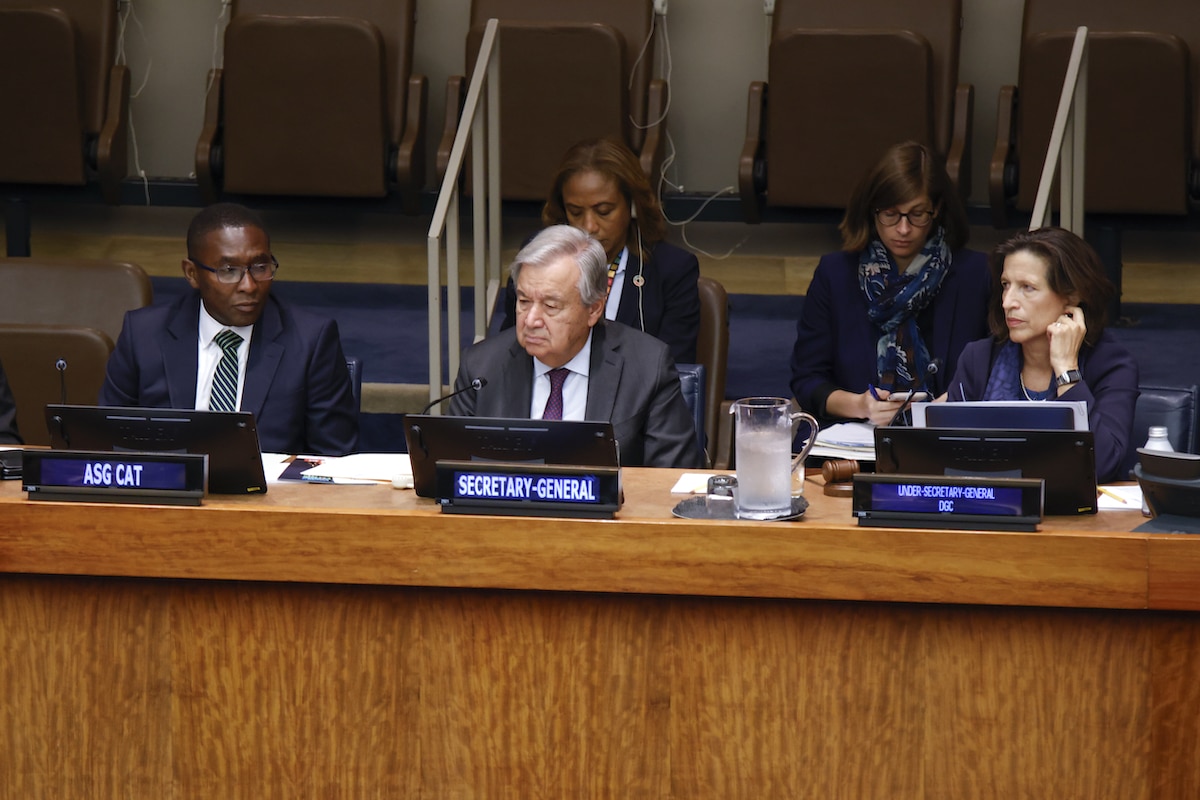Major Polluters U.S. and China Not Invited to Speak at UN Climate Ambition Summit

 Why you can trust us
Why you can trust us
Founded in 2005 as an Ohio-based environmental newspaper, EcoWatch is a digital platform dedicated to publishing quality, science-based content on environmental issues, causes, and solutions.
The United Nations Climate Ambition Summit in New York today brings together what UN Secretary-General António Guterres called the “first movers and doers” of the climate crisis with the goal of speeding up action on climate change by governments, local authorities, business and finance leaders and civil society ahead of November’s COP28 Climate Change Conference.
The Climate Ambition Summit’s list of 34 speakers conspicuously left out two of the world’s biggest polluters: the U.S. and China, reported Reuters.
The summit will be organized with three interrelated acceleration tracks in mind: ambition, credibility and implementation, a press release from the UN said.
“Our focus here is on climate solutions – and our task is urgent. Humanity has opened the gates of hell. Horrendous heat is having horrendous effects. Distraught farmers watching crops carried away by floods; sweltering temperatures spawning disease; and thousands fleeing in fear as historic fires rage. Climate action is dwarfed by the scale of the challenge,” Guterres said in his opening remarks at the summit. “If nothing changes we are heading towards a 2.8 degree temperature rise – towards a dangerous and unstable world. But the future is not fixed. It is for leaders like you to write it. We can still limit the rise in global temperature to 1.5 degrees. We can still build a world of clear air, green jobs, and affordable clean power for all.”
Speeches from leaders of countries that are responding to Guterres’ call to accelerate worldwide climate action, including Pakistan, Tuvalu, South Africa, Brazil, Canada and the European Union, are being featured at the summit, Reuters reported.
One of the summit’s goals is to inspire action from those countries and companies whose plans on climate are not in agreement with global climate targets.
“The path forward is clear,” Guterres said. “It has been forged by fighters and trailblazers – some of whom are with us today: Activists refusing to be silenced; Indigenous Peoples defending their lands from climate extremes; chief executives transforming their business models and financiers funding a just transition; mayors moving towards to a zero-carbon future; and governments working to stamp out fossil fuels and protect vulnerable communities. But if we are to meet the 1.5 degree limit and protect ourselves from climate extremes, climate champions, particularly in the developing world, need solidarity; they need support; and they need global leaders to take action.”
International financial institutions and non-member states that will have the opportunity to speak include the World Bank, Allianz, the International Monetary Fund, the State of California and the City of London, reported Reuters.
John Kerry, the U.S. Special Envoy on Climate Change, will attend the summit, but will not be giving a speech, according to a spokesperson.
Selvin Hart, climate adviser to Guterres, told Reuters that the purpose of not including certain countries and companies was not to “embarrass” them, but to inspire action.
Leaders were selected to speak if they had proposals for updating the pre-2030 climate plan for their country; had updated targets for transitioning to net-zero energy emissions that committed to no new gas, oil or coal; had plans for the phasing out of fossil fuels; and had new climate adaptation or funding pledges.
“We must make up time lost to foot-dragging, arm-twisting and the naked greed of entrenched interests raking in billions from fossil fuels,” Guterrez said in his opening remarks. “The proposed Climate Solidarity Pact calls on major emitters – who have benefitted most from fossil fuels – to make extra efforts to cut emissions, and on wealthy countries to support emerging economies to do so.”
The UN requires businesses, financial institutions and cities to have transition plans that are in line with the UN’s recommendations for integrity, along with targets for reducing emissions for 2025 that take indirect emissions into account, as well as plans for phasing out fossil fuels without relying on carbon offsets and committing to publicly advocate for climate action based on science.
“The Acceleration Agenda I proposed calls on governments to hit fast forward: So that developed countries reach net zero as close as possible to 2040, and emerging economies as close as possible to 2050 according to the principle of common but differentiated responsibilities. It also urges countries to implement a fair, equitable and just energy transition, while providing affordable electricity to all: By ensuring credible plans to exit coal by 2030 for OECD countries and 2040 for the rest of the world; by ending fossil fuel subsidies – which the IMF estimates reached an incredible U.S. $7 trillion in 2022; and by setting ambitious renewable energy goals in line with the 1.5 degree limit,” Guterres said.
A recent UN report said current emissions-cutting pledges were not enough to keep temperatures from going above the threshold of 1.5 degrees Celsius above the pre-industrial average, Reuters reported. An additional 20 gigatonnes of reductions in carbon dioxide emissions would be needed before 2030, with net zero worldwide by 2050.
Guterres called on the world’s biggest polluters to step up and make up for the inequalities of the climate crisis, saying, “We need a transformation to rebuild trust.”
“The Acceleration Agenda also calls for climate justice,” Guterrez said. “Many of the poorest nations have every right to be angry. Angry that they are suffering most from a climate crisis they did nothing to create. Angry that promised finance has not materialized. And angry that their borrowing costs are sky-high.”
Subscribe to get exclusive updates in our daily newsletter!
By signing up, you agree to the Terms of Use and Privacy Policy & to receive electronic communications from EcoWatch Media Group, which may include marketing promotions, advertisements and sponsored content.

 233k
233k  41k
41k  Subscribe
Subscribe 




